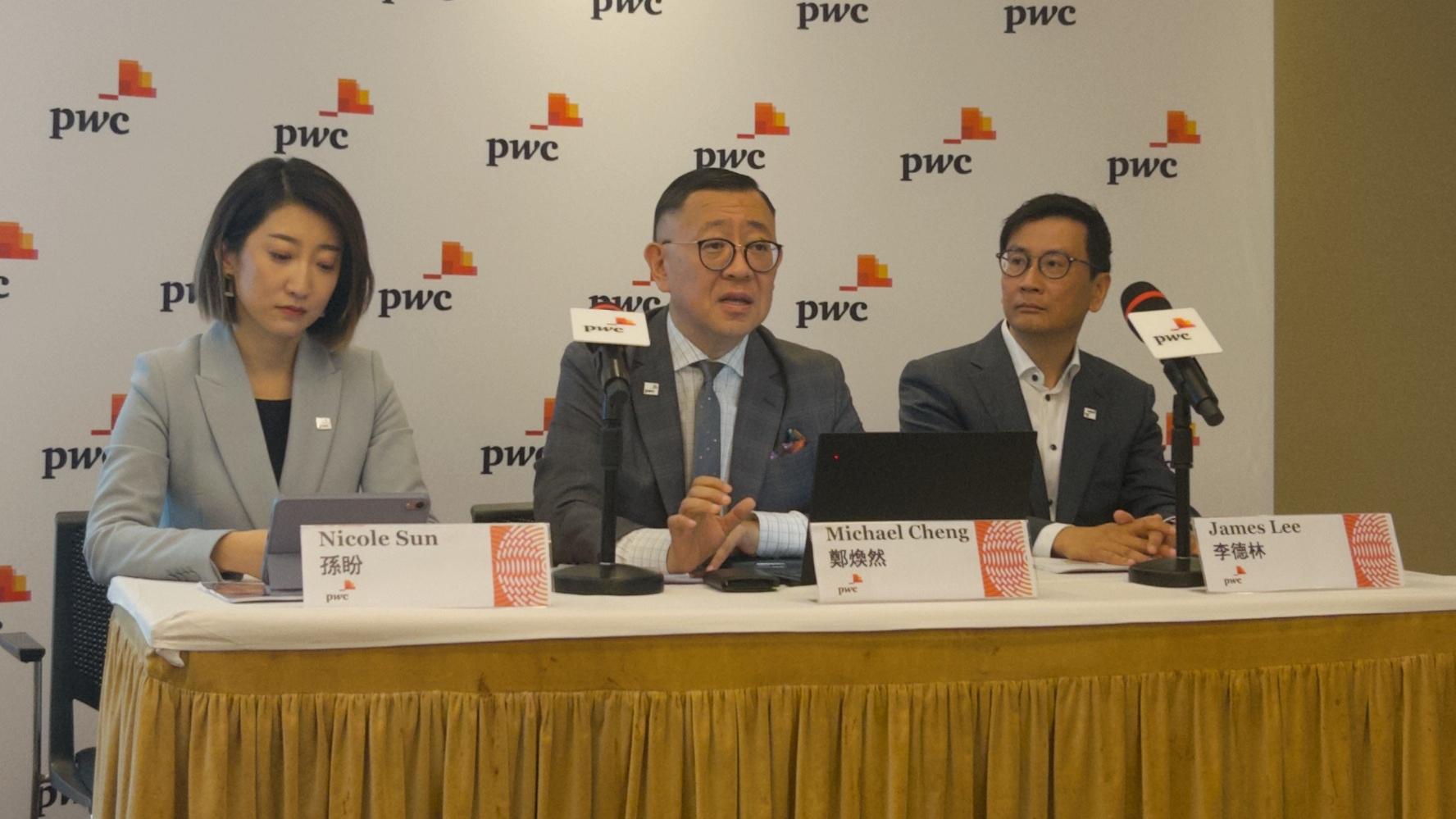 Michael Cheng Woon-yin (center), PwC's Asia Pacific, mainland and Hong Kong consumer markets leader; James Lee (right), PwC Hong Kong AI & Emerging Tech Consulting Leader; and Nicole Sun, PwC China M&A Advisory Partner, speak at a news conference to release the forecast for the outlook of Hong Kong's retail market on Aug 22, 2023. (LI XIAOYUN/ CHINA DAILY)
Michael Cheng Woon-yin (center), PwC's Asia Pacific, mainland and Hong Kong consumer markets leader; James Lee (right), PwC Hong Kong AI & Emerging Tech Consulting Leader; and Nicole Sun, PwC China M&A Advisory Partner, speak at a news conference to release the forecast for the outlook of Hong Kong's retail market on Aug 22, 2023. (LI XIAOYUN/ CHINA DAILY)
Consulting firm PwC is positive about Hong Kong’s consumer market outlook in 2023, and on Tuesday predicted 17 percent growth in annual retail sales to HK$408 billion ($52 billion), but said it expects a recovery to pre-pandemic levels to take 12 to 18 months.
The firm made its prediction following the release of the latest government figures earlier this month, which showed that, bolstered by the growth in the number of tourist arrivals and improved consumer sentiment, the provisional estimate for retail sales for the first half of 2023 is 20.7 percent higher than for the same period last year.
Hong Kong has seen a surge in revenge outbound travel after years of restrictions were lifted and the city reopened its border to the rest of world, and this has resulted in lower local consumption, according to PwC
During the first half of this year, Hong Kong welcomed nearly 13 million visitors, marking a recovery to approximately half the levels of those before the outbreak of the COVID-19 pandemic. Among them, tourists from the Chinese mainland accounted for around 78 percent with a total of 10 million visits, the Hong Kong Tourism Board’s data indicated.
READ MORE: Hong Kong retail sales up 7 percent in January
“Looking ahead, due to the continuing recovery of Hong Kong’s aviation and reception capacity, the number of inbound tourists is expected to increase. By the end of this year, mainland tourists should rebound to about 60 percent of the level before 2019, reaching an expected total of 20-25 million visitors over the year,” said Michael Cheng Woon-yin, PwC’s Asia Pacific, mainland and Hong Kong consumer markets leader.
“The distribution of a total of HK$5,000 consumption vouchers by the government in April and July has also helped to stimulate the local retail sector.”
With the gradual recovery in tourism and a surge in demand related to a propitious year for marriage, PwC anticipates the luxury sector, including jewelry, watches and clocks, and valuable gifts, will lead the revival in retail sales with a growth of 49 percent compared to the previous year. Sales of medicines and cosmetics, and sales in department stores, are projected to see a year-on-year increase of 45 percent and 41 percent respectively.
However, there are still several factors weighing on Hong Kong’s retail sales in 2023, resulting in an estimated recovery period of around 1 to 1.5 years before they return to pre-pandemic levels, the consulting firm said.
Hong Kong has seen a surge in revenge outbound travel after years of restrictions were lifted and the city reopened its border to the rest of world, and this has resulted in lower local consumption, according to PwC.
Also, the distribution of the second instalment of consumption vouchers in July did not seem to have as significant an impact as expected on stimulating local spending.
READ MORE: Hong Kong November retail sales dip 4.2%
As for the retail sectors driven by inbound tourism, PwC said the number of tourists visiting Hong Kong has not increased as rapidly as expected, and Chinese mainland visitors are not engaging in the same activities they did before the pandemic, such as purchasing luxury goods. Instead, they are now seeking in-depth cultural experiences.
“The retail and tourism industries can explore a greater variety of themes and services to enhance the image of Hong Kong brands and thus attract a broader range of consumers,” Cheng suggested.
He added that Hong Kong can also make efforts to attract more visitors from Southeast Asia to meet the region’s growing demand for travel, and capitalize on the economic opportunities presented by the emerging middle class in the region, which would help diversify the city’s visitor base and invigorate the retail industry.


